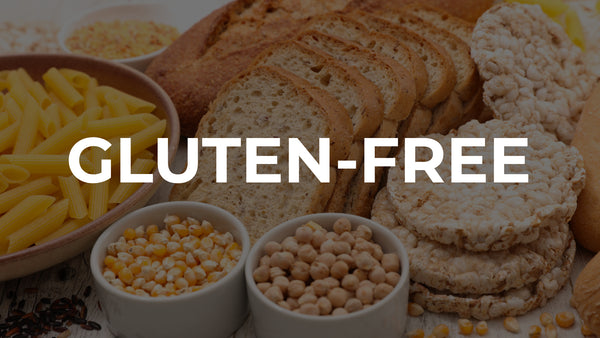No Products in the Cart

Do you walk past a food aisle in a supermarket and come across food products labeled “gluten-free”? That’s the new food fad hitting our lives. After all these years of being confined to health food stores, gluten free diets and foods have become a trend. But it’s beyond just a craze. For people who can’t tolerate gluten, a protein found in wheat, barley and rye, a gluten free lifestyle is a blessing.
Gluten-free foods have become an integral part of people’s lives now. Based on little or no evidence other than testimonials in the press and media, people have been switching to gluten free diets. So, if you’re one of those exploring the possibilities of a gluten-free lifestyle, here’s an insight to help you understand it better.
Understanding Gluten And Its Trouble

Gluten is more than just bread and pasta. If the ingredients come from wheat, it’s most likely that they contain gluten. Gluten is a protein compound that is difficult for the body to break down, causing various adverse reactions in the body. Gluten, as a protein, acts as a binder. It helps foods to maintain their shape.
Gluten is majorly found in wheat, barley and rye causing extensive effects to those who are gluten intolerant. It is commonly found in breads, pastas, alcohol, cereals, melted products, sauces and baked goods. These foods are considered common staples items in most households which makes them harder to replace or avoid.
Most people can consume gluten without having any sort of adverse effects. However, some people with celiac disease and gluten intolerance cannot tolerate it. People with wheat allergies and gluten sensitivity also avoid gluten-infused foods. There are two major reasons to avoid gluten at all costs:
It’s an autoimmune type of disease in which the body mistakes gluten as a foreign threat. In order to protect itself from the “threat”, the body overreacts and attacks the gluten protein. It further attacks the surroundings as well including the gut wall. This may lead to nutrient deficiencies, anemia, digestive issues or risk of heart diseases.
Symptoms of having a non-celiac gluten sensitivity are similar to celiac disease but with stronger stomach pain, irritable bowel motions, tiredness, bloating or a rush.
Gluten free Diet For Healthy Wellbeing

If you suffer from gluten sensitivity or disorders, it is necessary to eliminate bread, wheat pasta, and baked foods from your diet. Even if you don’t have any sort of gluten sensitivity, switching to a gluten free diet would be amazing for you. Gluten free diet helps you stay away from processed foods and burn calories. Here are some impressive benefits of switching to a gluten free diet today.

So for our fitness enthusiasts who are constantly watching what they eat, following a gluten free diet can help them get in proper shape as consuming wheat, bread and other packed foods contain gluten which increases weight. Gluten free foods can remove excess starch from food items helping you lose some good weight.
If you’re working out and following a certain meal plan including natural green protein like bGREEN Plant Protein can help you enhance your workout and support your active lifestyle. This green protein is packed with the wholesome goodness of excellent nutrients including green tea extracts and Vitamin b12. These proteins are derived from plant-based sources making them naturally healthy and cruelty-free supplements for muscle gain and workouts.
The small intestine plays one of the important roles in the digestion process. So, most of the nutrients present in the food are absorbed by the small intestine. Following a gluten free diet can help improve digestion and absorb the essential nutrients you eat.
People who suffer from gluten intolerance often experience chronic fatigue. This is due to consuming gluten foods that dames the intestines which affect the absorption of nutrients including iron. Iron deficiency leads to anemia which results in debilitating fatigue and exhaustion. Following a gluten free diet can heal your intestines improving nutrient absorption and boosting energy levels.

If you have gluten intolerance or celiac disease, you’re most likely to experience bloating and excess gas right after eating foods that contain gluten. When you switch to gluten-free foods, you will be able to instantly see the difference as your digestive discomfort will disappear and your stomach will be visibly flatter.

People who have gluten sensitivity and celiac disease are most likely to experience skin rashes including eczema or psoriasis. Consuming gluten-free foods can help you eradicate irritable skin conditions and improve your overall skin health by eliminating such problems.
Switching to a gluten free diet has numerous health benefits but it is important to make sure you consult a doctor before starting such diets to be aware of any sort of complications. So, if you’re still confused about starting your gluten free diet, you just got yourself an insight to start with. Make sure you consume sufficient nutrients to stay healthy.